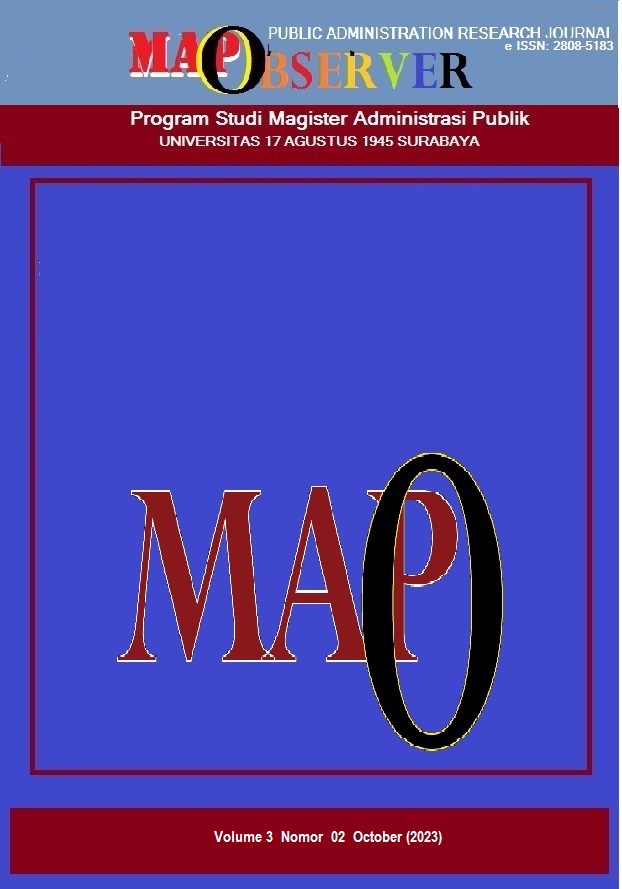EFFECTIVENESS OF HEALTH SERVICES IN JAILOLO REGIONAL GENERAL HOSPITAL
DOI:
https://doi.org/10.30996/mapo.v3i02.8379Keywords:
Effectiveness, Service, HealthAbstract
This study aims to determine the effectiveness of health services at the Jailolo Hospital and to determine the factors that influence the effectiveness of the Jailolo Hospital services. This research method uses a qualitative method with a descriptive research type. The data were collected by interview, observation, and documentation techniques. To determine the effectiveness of health services at the Jailolo Hospital, researchers analyzed data using six indicators according to the Regulation of the Minister of Health of the Republic of Indonesia number 4 of 2019 concerning Technical Standards for Fulfilling Basic Service Quality in Minimum Service Standards in the Health Sector. The results showed that the effectiveness of health services at the Jailolo Hospital had been carried out but not yet fully effective because there were still services that were complained about because they were not good in terms of discipline and comfort. Polyclinic directions were not provided, the lack of medical support equipment, and complaints were aspirated through the form of complaints that have been provided by the complaint installation. The Jailolo Hospital always improves and updates suggestions/aspirations from the community and factors that affect the effectiveness of services, namely the awareness factor of officers to serve service users with their capabilities. Regulatory factors greatly affect services as well as good timeliness procedures that have been set but have not been implemented by service personnel; the human resource factor affects the effectiveness of services because attitude training and education related to health services have not been provided. The service facility factor is also important for the achievement of service effectiveness because by providing medical services and medical support to the maximum, it will lead to a positive response from service users which can increase the effectiveness of Jailolo Hospital services.
Downloads
References
Supartiningsih, Solichah. 2017. “Kualitas Pelayanan an Kepuasan Pasien Rumah Sakit: Kasus Pada Pasien Rawat Jalan.”Jurnal Medicoeticolegal dan Manajemen Rumah Sakit 10.18196/jmmr.2016. 6. (1): 9–15.
Dewi, P. S. (2016). MANAJEMEN KESEHATAN BALAI WILAYAH KLATEN MAKALAH Disusun untuk memenuhi sebagian persyarata …
Fadli, Muhammad Rijal. 2021. “Memahami Desain Metode Penelitian Kualitatif.” Humanika. 21(1): 33–54.
RAPHAEL, SANDRA. 2019. “Descriptive Method.” An Oak Spring Sylva. 7(1): xxvii–xxviii.
Azis, Dikri Maulana, Hamidah Suryani Lukman, and Nur Agustiani. 2018. “Analisis Kesalahan Siswa Dalam Menyelesaikan Soal Matematika Pada Materi Sistem Persamaan Linear Tiga Variabel Kelas X SMAN 1 Cisaat.” Jurnal Tadris Matematika 1(2): 193–206.
Purnamasari. (2017). Pelaksanaan pelayanan administrasi terpadu kecamatan (paten) di bidang non perijinan di kantor kecamatan bontang utara kota bontang. EJournal Administrasi Negara, 5(3), 6477–6487. https://ejournal.an.fisip-unmul.ac.id/site/wp-content/uploads/2017/08/JURNAL (08-24-17-04-00-08).pdf
Downloads
Published
How to Cite
Issue
Section
License
-
The MAP Observer journal allows authors to retain the copyright of their papers without limitation. Authors may grant publishers non-exclusive publishing rights to publish articles. Granting first publishing rights to publishers also qualifies as unlimited copyright (because there are no restrictions imposed by publishers on author copyright).
-
Formal legal provisions for access to digital articles from these electronic journals are subject to the terms of the Creative Commons Attribution-ShareAlike (CC BY-SA) license, which means MAPO Observer Journal has the right to store, change formats, maintain in a database, maintain and publish articles without asking. permission from the Author as long as the Author's name is the owner of the Copyright.
-
Printed manuscripts and electronic publications are open access for educational, research and library purposes. Apart from these purposes, the editorial board is not responsible for violations of copyright law.









